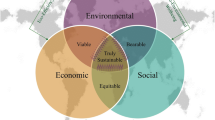Abstract
Several authors have pointed at opportunities to develop the well-established Business Balanced Scorecard into a Scorecard that enables companies to integrate sustainability into their strategy. Recent case studies and research experiences show that social and environmental targets are more widely recognized as strategic drivers for management. However, experiments also show that the traditional Scorecard has its limits when it comes to e.g. stakeholder management and product chain management. The European Corporate Sustainability Framework(ECSF) program distinguishes several ambition levels for Corporate Sustainability/Corporate Responsibility. The traditional Balanced Scorecard is suitable for companies that aim for Compliance-driven CS/CRor for Profit-driven CS/CR, where the financial bottom line is the ultimate indicator for success. More ambitious companies want to balance economic, social and ecological targets in a Community-driven CS/SRor Synergy-driven CS/CR.For ambitious companies, we propose a format of a Responsive Business Scorecard (RBS). The Responsive Scorecard enables companies to score at Profit, People and Planet, at the same time to integrate stakeholder demands into internal programs to improve performance. The RBS includes five Perspectives: Customers&Suppliers, Financiers&Owners, Society&Planet, Internal Process and Employees&Learning.We assessed the practical feasibility of a Responsive Scorecardin food and tourist industries. In the food industry, we analyzed whether existing business priorities of Italian companies can adequately fill a Responsive scorecard.Our conclusion is that traditional topics like finance, customers and employees are readily filled, but that sustainability topics like chain management (suppliers) and environmental performance (planet) need further elaboration. The tourist sector is dominated by Small and Medium Sized Enterprises. We investigated whether existing eco-labels for camping-sites and marinas can be developed into Responsive Scorecards. Our conclusion is that such a sector specific development of a Responsive Scorecard is possible. Further research has to show what is the value added of the new scorecard for companies in the tourist sector.
Similar content being viewed by others
References
Bollaert, C.: (2002), Duurzame Jachthaven-de Eerste Stap. Waterpakt, Harlingen.
Caldelli, A.: (2003), Key Performance Indicators for a Management Information System of two Italian food producers. ECSF-Mimeo, SCS Azionninnova, Bologna.
Figge, F. et al.: (2002), “The sustainability balanced score-card-linking sustainability management to business strategy”, Business Strategy and the Environment 11, 269-284.
Graaf, F. J. de and T. P. J. B. Sanders (ny): Duurzame zaken. Mimeo, Amsterdam.
INSEAD: 2003, Presentations of the Balanced Scorecard and Sustainability Conference, 20 November 2003, Fontainebleau.
Kaplan, R. and D. Norton: (1996), The Balanced Scorecard: Translating Strategy into Action. Harvard Business School Press, Boston, Mass.
Marrewijk, M. van: (2003a), A Value Based Approach to Organization Types. ECSF orking paper, Rotterdam.
Marrrewijk, M. van: (2003b), 'Concepts and definitions of CSR and Corporate Sustainability,' Journal of Business Ethics, May 2003.
Marrewijk, M. van and T. W. Hardjono: (2003), 'The European Corporate Sustainability Framework for managing complexity and corporate transition', Journal of Business Ethics, May 2003.
Marrewijk, M. van and M. Were: (2003), 'Multiple Levels of Corporate Sustainability', Journal of Business Ethics, May 2003.
NIDO, J. Cramer, T. Rutten en and R. van Tilburg: (2001), Duurzaam ondernemen: praktijkervaringen met een nulmeting. Leeuwarden.
www.ecsf.info: (2003), European Corporate Sustainability Framework website, seen 24 December 2003.
www.eu.int/comm/environment/industry/eco-label, seen 10 March 2003.
www.milieubarometer.com (2003), 23 July 2003.
www.sqeme.nl (2003), seen 23 July 2003.
Woerd, K. F. van der and T. van den Brink: (2002), Beyond the Business Balanced Scorecard-Building blocks for a Business Sustainability Scorecard. W-02/19, IVM-VU, Amsterdam.
Zingales, F. et al.: (2002), Balanced Scorecard and Sustain-ability-State of the art review, CMER Working papers 2002/65, INSEAD, Fontainebleau.
Author information
Authors and Affiliations
Rights and permissions
About this article
Cite this article
Woerd, F.V., Brink, T.v.d. Feasibility of a Responsive Business Scorecard – a pilot study. Journal of Business Ethics 55, 173–186 (2004). https://doi.org/10.1007/s10551-004-1900-3
Issue Date:
DOI: https://doi.org/10.1007/s10551-004-1900-3




